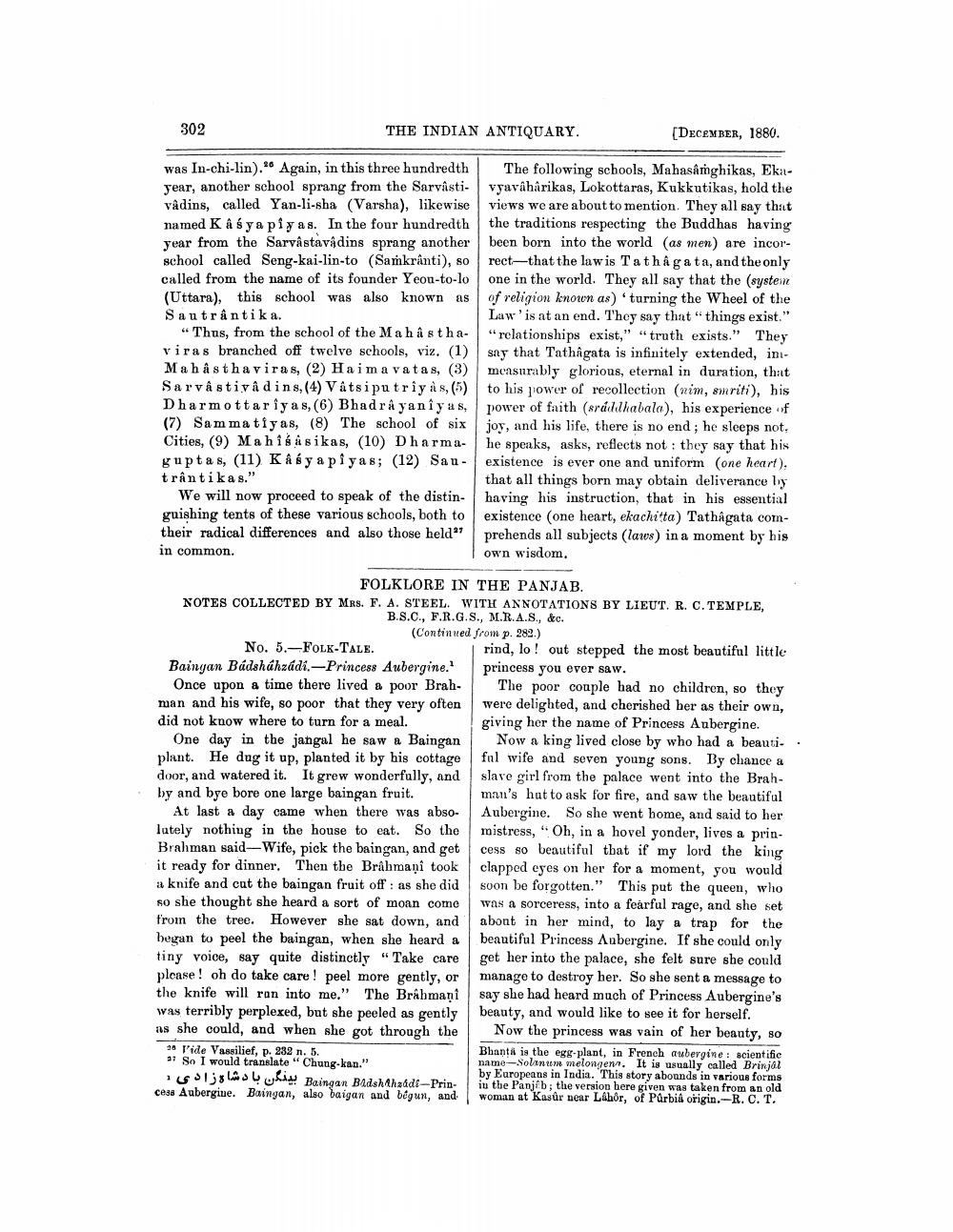________________
302
THE INDIAN ANTIQUARY.
[DECEMBER, 1880.
was In-chi-lin). Again, in this three hundredth The following schools, Mahasanghikas, Ekayear, another school sprang from the Sarvasti vyaváhârikas, Lokottaras, Kukkutikas, hold the vàdins, called Yan-li-sha (Varsha), likewise views we are about to mention. They all say that named K Asya piyas. In the four hundredth the traditions respecting the Buddhas having year from the Sarvastavadins sprang another been born into the world (as men) are incorschool called Seng-kai-lin-to (Sankranti), so rect—that the law is Tathagata, and the only called from the name of its founder Yeon-to-lo one in the world. They all say that the system (Uttara), this school was also known as of religion known as 'turning the Wheel of the Sautrântika.
Law' is at an end. They say that "things exist." “Thus, from the school of the Ma ha stha- "relationships exist," "truth exists." They viras branched off twelve schools, viz. (1) say that Tathagata is infinitely extended, inMa hastha viras, (2) Haima vatas, (3) measurably glorious, eternal in duration, that Sarvâstivâ dins, (4) Vätsiputriy às,(5) to his power of recollection (nim, smriti), his Dharmottar iy as, (6) Bhadr å yanîyas, power of faith (rádithabala), his experience of (7) Sam matiyas, (8) The school of six joy, and his life, there is no end; he sleeps not, Cities, (9) Mahisasikas, (10) Dharma
he speaks, asks, reflects not : they say that his guptas, (11) K & sya piyas; (12) Sau- existence is ever one and uniform (one heart), trântikas."
that all things born may obtain deliverance liy We will now proceed to speak of the distin- having his instruction, that in his essential guishing tents of these various schools, both to existence (one heart, ekachitta) Tathagata comtheir radical differences and also those held" prehends all subjects (laws) in a moment by his in common.
own wisdom.
FOLKLORE IN THE PANJAB. NOTES COLLECTED BY MRS. F. A. STEEL WITH ANNOTATIONS BY LIEUT. R. C.TEMPLE,
B.S.C., F.R.G.S., M.R.A.S., &c.
(Continued from p. 282.) No. 5.-FOLK-TALE.
rind, lo! out stepped the most beautiful little Baingan Badshahzadi.-Princess Aubergine. princess you ever saw.
Once upon a time there lived a poor Brah- The poor couple had no children, so they man and his wife, so poor that they very often were delighted, and cherished her as their own, did not know where to turn for a meal.
giving her the name of Princess Aubergine. One day in the jangal he saw a Baingan Now a king lived close by who had a beauti.. plant. He dug it up, planted it by his cottage fal wife and seven young sons. By chance a door, and watered it. It grew wonderfully, and slave girl from the palace went into the Brahby and bye bore one large baingan fruit. man's hat to ask for fire, and saw the beautiful
At last a day came when there was abso- Aubergine. So she went home, and said to her lately nothing in the house to eat. So the mistress, "Oh, in a hovel yonder, lives a prinBrahman said-Wife, pick the baingan, and get cess so beautiful that if my lord the king it ready for dinner. Then the Brahmani took clapped eyes on her for a moment, you would a knife and cut the baingan fruit off : as she did soon be forgotten." This put the queen, who so she thought she heard a sort of moan come was a sorceress, into a fearful rage, and she set from the tree. However she sat down, and abont in her mind, to lay a trap for the began to peel the baingan, when she heard a beautiful Princess Aubergine. If she could only tiny voice, say quite distinctly " Take care get her into the palace, she felt sure she could plcase ! oh do take care ! peel more gently, or manage to destroy her. So she sent a message to the knife will ran into me." The Brahmani say she had heard much of Princess Aubergine's was terribly perplexed, but she peeled as gently beauty, and would like to see it for herself. as she could, and when she got through the Now the princess was vain of her beanty, so 16 l'ide Vassilief, p. 232 n. 5.
Bhanta is the egg plant, in French aubergine: scientific 97 So I would translate " Chung-kan."
name-Solante melongen. It is usually called Brinjal
by Europeans in India. This story abounds in various forms IUSSIS WA Baingan BadshAhaadi-Prin- in the Panjib: the version here given was taken from an old cess Aubergine. Baingan, also baigan and begun, and woman at Kasar near Lahor, of Púrbil origin.-R.O.T.




